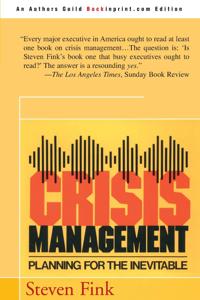
Want to learn the ideas in Crisis Communication better than ever? Read the world’s #1 book summary of Crisis Communication by Steven Fink here.
Read a brief 1-Page Summary or watch video summaries curated by our expert team. Note: this book guide is not affiliated with or endorsed by the publisher or author, and we always encourage you to purchase and read the full book.
Video Summaries of Crisis Communication
We’ve scoured the Internet for the very best videos on Crisis Communication, from high-quality videos summaries to interviews or commentary by Steven Fink.
1-Page Summary of Crisis Communication
A Crisis Will Occur – Be Ready
Companies inevitably face crises, and they usually happen at the worst possible time. Crises demand immediate attention, disrupt normal activities, require a coordinated response and threaten businesses. They can appear in many forms—from natural disasters to financial problems. To deal with them effectively, companies need to have crisis plans ready in advance.
Be aware that if you are in a crisis, your company will be negatively impacted. Your actions during the crisis can either boost or burn your organization. It is important to control the message and take action when dealing with a natural disaster. You should have an organized team ready to respond at all times, as well as procedures for communicating with employees and stakeholders about what’s happening and how they can help out. Choose your communication targets (such as customers, investors, etc.), choose tools for delivering those messages (press releases), and create messages that will effectively communicate what is going on so people understand it better.
Risk management is a relatively new field that deals with the protection of companies. Risk managers need to be aware of many different kinds of risks, from pollution to theft and more. The communications director and PR team must work with risk managers in order to minimize company exposure and preserve its reputation. A negative media story can deeply damage a company’s image, but companies can recover from such episodes if they take some steps after the crisis:
In order to determine the extent of damage, you should survey your customers and employees. This will enable you to set goals that can help restore your reputation.
Companies need to focus on their core audience. It’s important to maintain a positive image, so companies should invest in reputation management before a crisis occurs. A good public image also provides competitive advantage and credibility for the company. Companies can develop a strategic plan that will help them attain that goal of having a positive public image.
The Internet’s Impact on Crisis Communication
The Internet is a powerful medium for communication. It can take local crises and make them global ones in just a few hours, as news travels at lightning speed. You should use your company website to tell the story of the crisis according to how you want it portrayed. Set up a site that will be reliable information source for media and public during this time of crisis. Be sure to include bloggers in your efforts because they are an important part of this process. Try not to communicate with bloggers using corporate speak or defensive responses because both will fail miserably when communicating online. Also, provide dynamic resources on your website so people can get all kinds of content quickly and easily, including ways to contact key members within your organization through click-to-phone links if needed during the crisis period.
The Issue of Fraud
When a business is involved in a scandal, it needs to take fast action. This is especially true when the scandal involves fraud. In this situation, your company needs to act quickly and demonstrate that it’s honest and trustworthy. Your company’s reputation for honesty is an incredibly valuable asset, so you need to protect it at all costs. If there was fraud in your company, make sure that you admit it as soon as possible. If not, don’t deny anything; just say that you’ll investigate the matter fully and then issue a statement about what happened once you know more details about the situation. Never wait too long before issuing any statements or denying anything; if people think that your company waited too long before making its position clear on something important like this, they’ll be much less likely to trust whatever information comes out of your mouth next time around—and they might even boycott your products or services altogether! Also make sure that third-party sources confirm any claims or statements made by yourself or anyone else associated with your organization regarding the incident in question: this will help bolster public confidence in what you have to say on this subject going forward.





